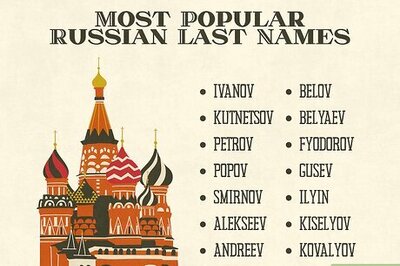
views
Unlike many entrepreneurs of the 19th century, American industrialist Joseph Wharton believed that the art of business was better learnt through formal instruction, than practice. Having started his career as an apprentice himself, it was rather strange to see Wharton endorse this idea, but his conviction was so strong that he ran the risk of pledging $100,000 to establish an entire institute for it — a decision that he never regretted.
Wharton Business School — as we know it today — enrolled its first MBA class in 1921, and has since produced scores of influential personalities including investors, businesspersons, bankers, economists, Nobel laureates and current and former CEOs of Fortune 500 companies.
Of late, however, the demand for blue-chip MBA has taken a severe hit. Elon Musk, an alumnus of Wharton, and possibly the most inventive businessperson in the modern era, even went so far as to indicate that an MBA is becoming increasingly worthless. And, he does have a fair case.
Even a year before the COVID-19 pandemic, premier business schools in the US were beginning to witness significant decline in applications. While Harvard and Stanford experienced a near 5 per cent drop, Wharton, Michigan Ross, Chicago Booth and UC Berkeley recorded a combined decline of 7.5 per cent. Just months later, University of Illinois, Trulaske College of Business and University of Iowa decided to temporarily shut down their full-time MBA programmes.
And to add salt to the wound, the pandemic wreaked havoc on struggling B-schools world over, forcing some to completely close down and others to resort to damage control.
All these episodes bring us back to the same old question — Is MBA losing its sheen? And do we really need one to successfully run a business?
Shiv Nadar of HCL, Byju Raveendran of Byjus, Ritesh Agarwal of OYO Rooms, Sachin Bansal of Flipkart (and now Navi), Bhavish Aggarwal of Ola Cabs, Kunal Shah of CRED either do not hold an MBA or did not complete one.
In addition to the rise of self-made entrepreneurs, the tremendous growth of technology and online outlets has left many universities struggling for answers. It won’t be inapt to say that an 18-year-old influencer today possesses better moneymaking skills than an MBA graduate who chewed up age-old business concepts in an air-conditioned classroom.
The reason? Instead of reading principles from a 20th century manual, they are prepared to try it hands on. And more often than not, with a few hiccups and adaptations along the way, they gradually get to grips with the art of moneymaking.
The same can’t be said about an erudite MBA graduate who is — almost intuitively — risk averse.
Many educational institutions have failed to realise this paradigm shift and continue to feast their eyes on prolonged lectures, class presentations, assignments and age-old case studies — an uncompromising tradition that is being followed for decades.
In an attempt to unearth new possibilities, a business school in Kerala has finally decided to question the status quo. Owned and operated by an engineer-turned-entrepreneur, Lead College of Management, Palakkad, has commenced what is called an ‘E-School’ (Entrepreneurship School) — a complete departure from the widely acknowledged model of a ‘B-School’.
As opposed to the customary 9 am-5 pm lectures, the students here spend more time with industrialists, innovators, business consultants and startup founders, which help them gain meaningful insights about real-world business solutions.
The college, situated in the picturesque village of Dhoni, also has its own farm from where students are assigned the task of procuring vegetables, fruits and dairy products for daily consumption. Once the sourcing is done, they collectively decide the canteen menu, secure the remaining ingredients from outside agents and supervise the transit of goods, all while keeping track of inventory and cost.
“These are baby steps to learning Supply Chain Management,” argues Dr Thomas George, the founder of this unique enterprise.
Students are given a free hand at everything from office administration to managing the library, monitoring the books of accounts and even supervising admissions — a system quite akin to an apprenticeship where the idea is to ‘learn by doing’. Needless to say, the level of camaraderie here is so strong that even professors are addressed as ‘chetta’ (meaning brother in Malayalam).
Cut from the same cloth, the Delhi government’s ‘Business Blasters’ programme has gained nationwide recognition for encouraging young minds to develop entrepreneurial ideas for the future. The platform, launched in September last year, received 51,000 startup ideas from high school students in Delhi, of which 1,000 have been shortlisted for further administering.
The government plans to handpick the best 100 ideas, and nurture them with appropriate funding, robust industrial assistance and direct access to investors — a finer alternative to just ‘studying’ business.
In view of the recent awakening, institutions such as IIM Bangalore, SP Jain, NMIMS Mumbai and Nirma University are now offering MBA in both Entrepreneurship and Family Business, with some offering specialised courses for aspiring women entrepreneurs as well. Considering the fact that family businesses contribute nearly 70 per cent of the nation’s GDP, this too is a serious game changer.
If the trend holds true, soon enough, lectures will be replaced by discussions, PowerPoint presentations will be substituted by live projects and teachers will make way for facilitators — offering us an opportunity to not only revive entrepreneurship, but to restore the lost glory of business schools.
True, it may dampen the spirits of some. But it is hard not to appreciate an honest attempt at eliminating the job-seeking mentality of India’s youth, and filling the void with job providers — a fraternity that the nation so badly needs.
Nirmal Abraham is a Management Professor, columnist and political analyst who has adjudicated several competitive events in the domain of business and entrepreneurship in India. The views expressed in this article are those of the author and do not represent the stand of this publication.
Read all the Latest Opinions here



















Comments
0 comment